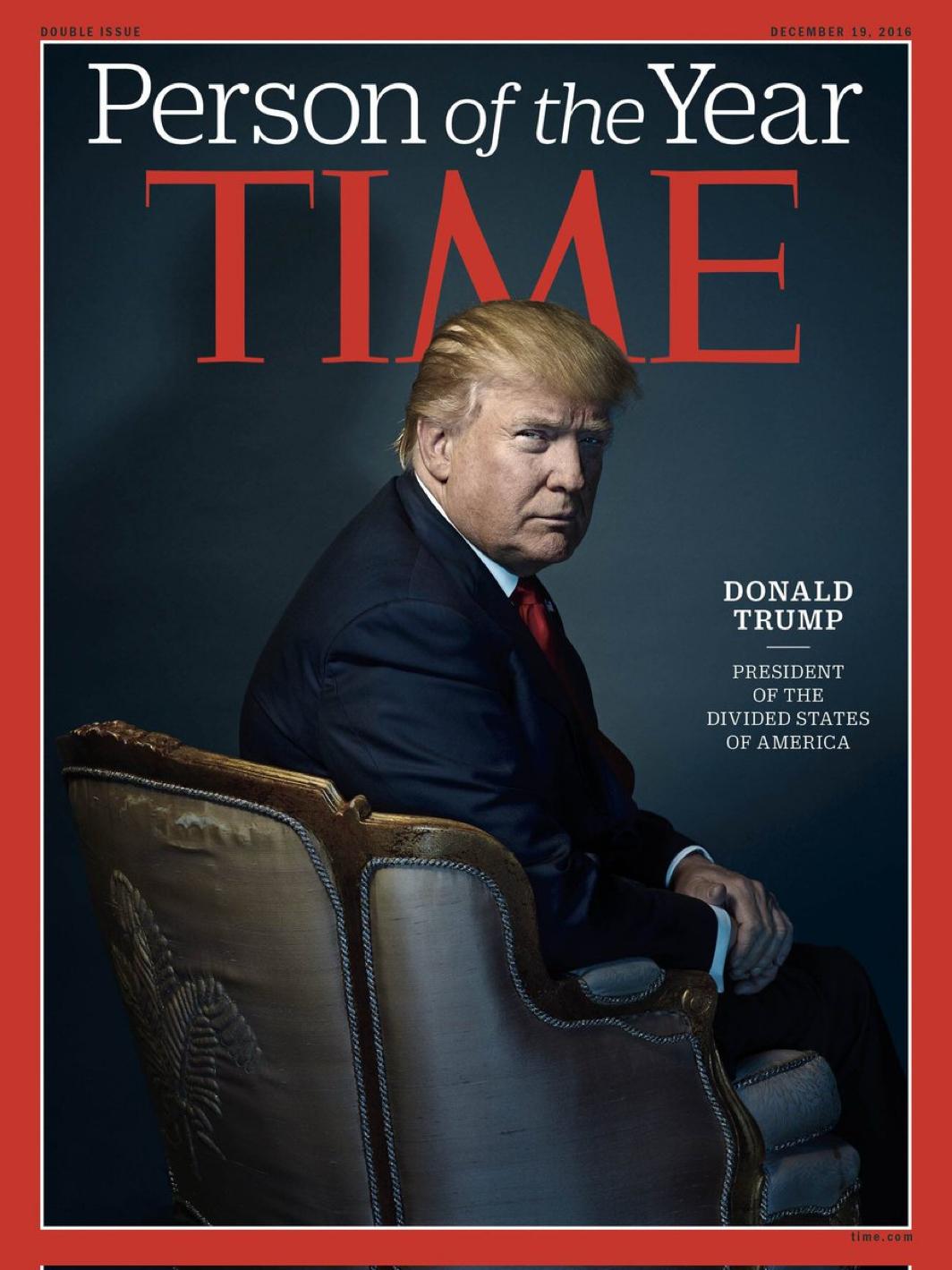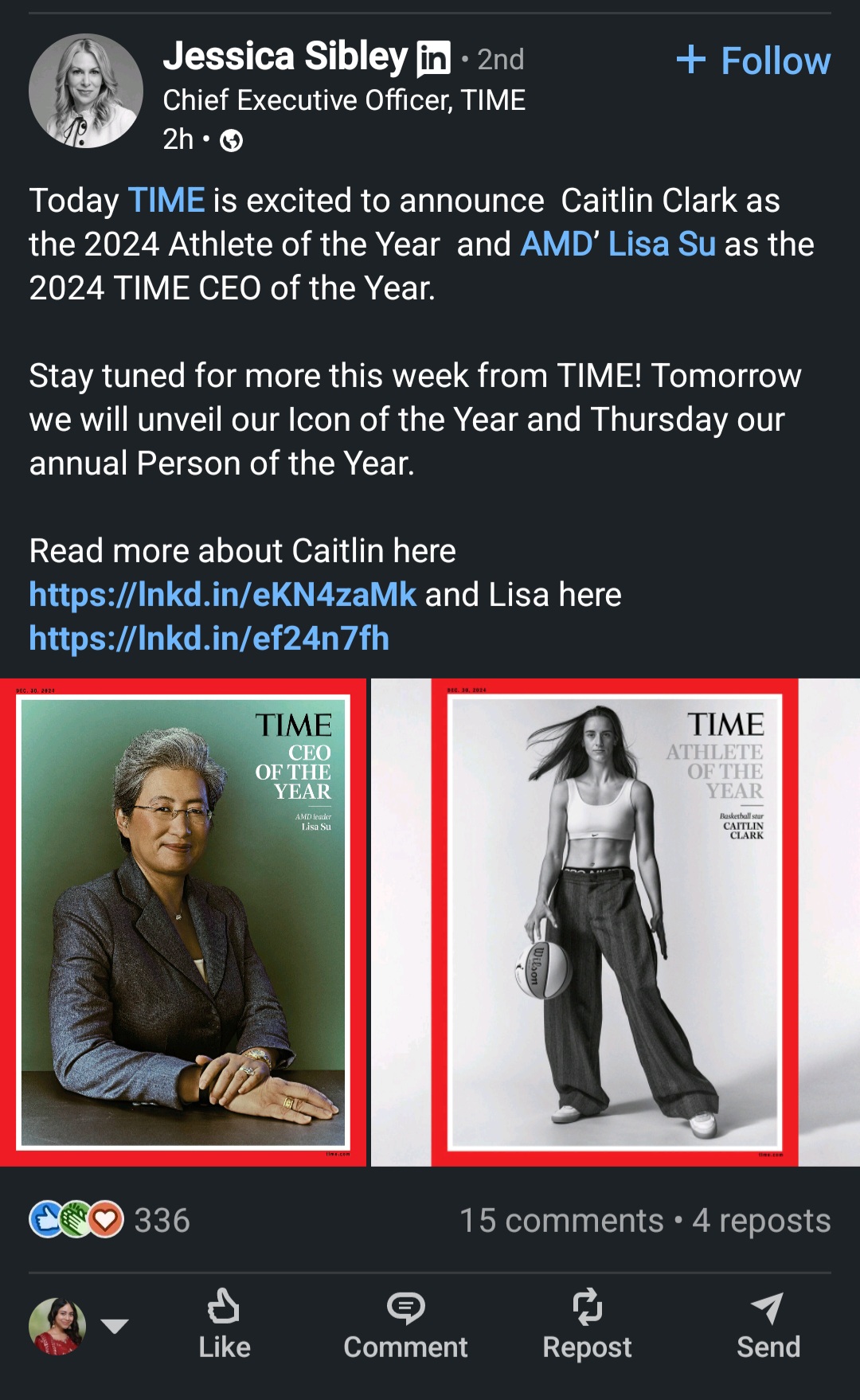
Each answer resolves YES if that answer is directly named as TIME's Person of the Year for 2024 (either alone or in conjunction with another person or thing). Otherwise NO.
It must be directly named. For example, if the Person of the Year is "Elon Musk and X", then Elon Musk resolves to YES. If, however, the Person of the Year is the "The X Team", then Elon Musk resolves to NO.
Answers in brackets such as [Any Artificial Intelligence] or [The US President] resolve if such entity is named as Person of the Year. More details for those are below.
Anyone can add more answers, but if you wish to add an answer in brackets please ask or suggest it first in the comments - otherwise, it's too easy for them to be ambiguous or confusing, and I may edit or remove them at my discretion.
Details and examples
Example: if the person of the year is "AI" or "Artificial Intelligence" then AI resolves YES while ChatGPT resolves NO. If the POTY is ChatGPT then "Artificial Intelligence" resolves NO. If POTY is "AI Scientists" or "OpenAI", then AI and ChatGPT both resolve NO. If the person of the year is "Sam Altman and ChatGPT", then both of those answers resolve YES while AI resolves NO.
If Time's cover and other Time webpages have different winners for the Person of the Year, only one of them has to mention the answer as the winner for it to resolve YES.
The phrase "Person of the Year" (POTY) refers to any Entity of the Year, even if it isn't a person - e.g. in past years TIME has selected a Machine of the Year or Planet of the Year, and that would count for this market the same as a Person of the Year.
This market resolves after the TIME's Person of the Year is announced by TIME magazine. If for any reason the TIME's Person of the Year is not announced before February 2025 (Eastern time), all answers will resolve to NO.
It is not necessary for the wording used in TIME's announcement to exactly match the wording of the answer. For example, if they say "Donald J Trump" the answer "Donald Trump" still resolves YES. Or if a person changes their name, the market resolves based on the person, not their name. The resolution is based on the specified person or thing, not based on the exact words used.
Rules for special answers:
[Any Artificial Intelligence] resolves YES if any AI is named as Person of the Year. Both generic terms for AI, such as "Artificial Intelligence", "Large Language Models", and "Generative AI", and specific AI systems, such as "ChatGPT" and "GPT-4", count as YES. However, "Sam Altman" or "OpenAI" would not count.
[Any head of state or government, current or former] resolves YES if the person is, or was previously, a head of state or head of government according to https://en.wikipedia.org/wiki/List_of_current_heads_of_state_and_government. A future head of state or government does not suffice.
[The winner of the 2024 US Presidential Election] is defined as the person who is called as the winner of the election by the Associated Press, Fox, and NBC if they all call the race for the same person; otherwise the same as https://manifold.markets/jack/who-will-win-the-2024-us-presidenti-8c1c8b2f8964 (i.e. the official Electoral College winner).
[The 2024 US VP-Elect] is defined the same way but for the winning vice presidential candidate.
Related to https://manifold.markets/BTE/who-will-be-time-magazines-2024-per but there are a few key differences - one issue with the other market is that when multiple answers are named then they resolve equally split (e.g. two resolve to 50% instead of 100%), but if multiple things are named and only one is an answer then it resolves to 100%, so it just makes things a lot more complicated. This market also allows us to use answers like [Any Artificial Intelligence].
2023 market: https://manifold.markets/jack/who-will-be-time-person-of-the-year-62c345c32ec8
.
@AndrewHebb 25000M of yes shares at 98%. I think he counts as a former head of state
For anyone interested in announcement date: https://manifold.markets/IsaacLiu/on-what-day-will-the-2024-time-pers
.
Hey @jack you REALLY shouldn't be trading in your own market here, lol. You made a post-hoc rules clarification after moving a market value by 30% and setting up a 10k limit order. I think the fact that the market was so miscalibrated was evidence in the subjectivity of the criteria. These kinds of markets are notoriously difficult to resolve with tons of edge cases.
I trade in my own markets when they are reasonably unambiguous. I will happily defer on the decision to other mods in this case since you bring it up - I like to do so anyway whenever there may be a conflict of interest. I thought it was fully unambiguous, but you think not, so we'll see what other mods say and leave it up to them.
Note that I was heavily trading in all options before responding to your question. I put up a lot of limit orders on many options, it's not at all specific to this.
A big reason I made this market is because I really don't like trading the other POTY markets - having to reason about the resolution being split between answers 50-50 etc makes my head hurt.
Yeah, the rules already cover that. I wrote it as current or former, not future, and the descriptions are very unambiguous about that. I could add another one that includes elects as well, but then I'd have to write rules for who counts as an electoral winner globally which sounds nontrivial to handle edge cases. (Imagine adjudicating who won in Venezuela -Other markets can adjudicate that, I want this market to be simple)
@jack that's not "unambiguous" in any way! Head-of-state-elects are often described as the "current head of state" and the former head of state described as a "lame duck head-of-state" during the transitional period between an election and an inauguration!
Hmm. I had never heard anyone describe the president elect as the current head of state, that seems like stepping away from the obvious meaning of the words. The president elect is a future president and not a current president. You agree with that, I hope? Because I just can't imagine anyone calling the president elect the current president.
As per another comment thread, I will happily defer to other @mods for this decision. So take the above as my personal take, not a final ruling.
For reference, the original rules were:
[Any head of state or government, current or former] resolves YES if the person is, or was previously, a head of state or head of government according to https://en.wikipedia.org/wiki/List_of_current_heads_of_state_and_government.
Then because I anticipated the confusion I added this sentence to the description (this happened very early in the market, before Ben asked the question.)
A future head of state or government does not suffice.
I view this addition as "just to help readers understand" and not as a change to the rules - the goal was to just explicitly call out that the words "is, or was previously".
If I've understood Ben's comments above right, his claim is that a president-elect does count as a "current head of state":
Head-of-state-elects are often described as the "current head of state" and the former head of state described as a "lame duck head-of-state" during the transitional period between an election and an inauguration!
In my opinion, Jack's interpretation is correct and the reasonable interpretation of the rules. The head of state/government is the person who currently occupies the position, and the person who exercises the power of the position.
Because there’s a grey area between the president as elected and the president with current de jure power under the constitution!
Not really, there is one president who has executive authority, and the president-elect isn't president yet. One can launch the nukes, the other can't. The president speaks for the country as the head of state and takes executive actions as head of government, and the president-elect doesn't.
Head-of-state-elects are often described as the "current head of state"
I don't think I've ever seen this, link?


